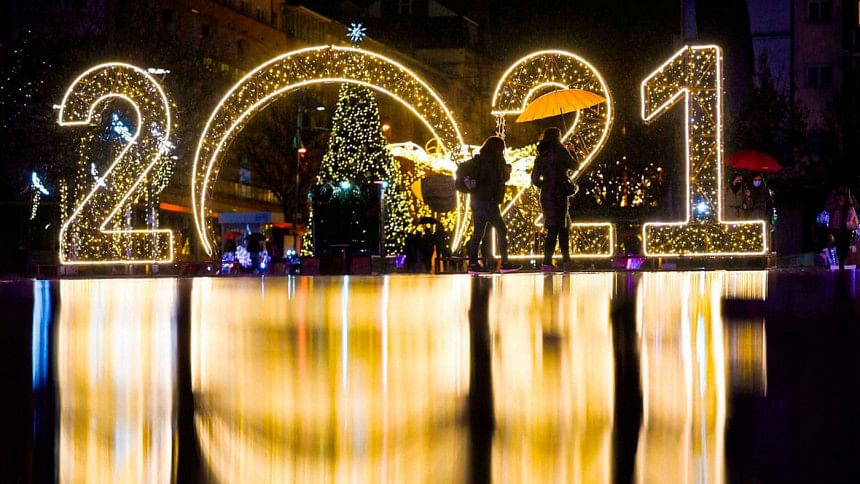With vaccines on the way, 2021 promises a return to normal life

Never in history had the world as a whole looked forward to a new year like we did in 2020. So far, welcoming a new year had been a routine exercise. People exchanged greetings, sent gifts to their loved ones, and held parties to welcome a new year knowing well that it would not be much different from the previous one. But not this time. People all over the world are sincerely hoping that this year will be significantly different from 2020 and will usher in a new era to turn their fates for better ones. This is all due to the havoc caused by the Covid-19 pandemic.
Worldwide, the virus has infected 83 million people and killed 1.8 million so far. Surprisingly, the highest number of cases and deaths was recorded in the United States, with 20 million infected and over 335,000 killed, followed by India with 10 million infected and over 148,000 killed. In Bangladesh, over 512,000 people were infected and over 7,500 killed. It is sad to lose so many lives in one year due to a single cause. Words are not enough to console those who lost their loved ones. In Bangladesh, we lost many important and some iconic personalities in the fields of education, literature, medicine, culture, industry, business, etc. These losses are irreparable.
In addition to the loss of lives, what affected us most are the disruptions to normal life and their impact on economy. Either due to lockdown or safety reasons, people were confined to their homes. Educational institutions were closed. Markets shrank. Many offices and small businesses were closed. In the process, a significant portion of the workforce lost their jobs. People in the low-income group suffered the most. They depended heavily on charities by the government and non-governmental organisations for their survival. The government, like many foreign governments, announced several stimulus packages to help the industries and small businesses so that they could carry on with their operations.
Many offices allowed their employees to work online from home. People in urban areas also started to buy essential items online from retailers. Some educational institutions offered courses online. These practices generated a new way of conducting business.
Initially, very little was known about Covid-19, except that it was highly contagious. There was no vaccine and till now, there is no cure for the disease. Doctors treated patients depending on the symptoms. With experience, the treatment procedure has improved significantly over the year and, consequently, the death rate of infected people has also decreased. Even then, a second wave of the pandemic is causing huge devastations in many countries, particularly in Europe and America.
Pandemics came and went through the ages but human ingenuity never surrendered. It prevailed. Scientists around the world did not give up. With unprecedented haste, several vaccines have been developed and some countries have already started administering the vaccines. This has shown a ray of hope at the end of the tunnel. All countries around the world are now in competition with each other to get the vaccines. As expected, the rich countries are in an advantageous position as they had the resources to order the vaccines even before their approval. So they are getting the vaccines before the less developed and less resourceful countries. Bangladesh is hoping to get vaccine doses by the end of January or early February, according to government sources.
By early 2021, several new vaccines may also appear in the market. Hopefully, their arrival will ease the availability of vaccines globally. Until a cure for the disease is discovered, the vaccines will play a vital role in controlling the pandemic. People all over the world are, therefore, pinning their hopes on the vaccines and planning to start a new life in 2021.
Students who have not attended school for months are dreaming of going back to their classroom again. Life became miserable for them all these months as they were not able to meet, gossip and play with their friends. Owners of small enterprises are thinking of starting their business again. Industrialists are planning to expand production. Working people who lost their jobs are hopeful of getting back their old jobs or starting new ones. Fresh unemployed graduates are preparing to apply for new jobs. The government is planning to quickly implement the ongoing projects which got delayed due to the pandemic, and start new projects in order to accelerate the economic development of the country.
Social activities came to a standstill during the pandemic. Relatives were not able to meet each other. Many senior citizens have not seen their children or grandchildren for months. They are planning to meet each other again. Friends are hoping to meet again over cups of tea or coffee at their favourite hangouts. Social events like weddings, get-togethers and picnics are also being planned for 2021. Foreign trips are being booked to meet friends and relatives living abroad or for simple vacation purposes. Hotels and tourism businesses are hoping to start their activities again. Nearly empty airports, sea beaches, holiday resorts and restaurants will soon hum with tourists and guests. Shopping malls will be full of shoppers. Young boys and girls will spend time at tea shops like they did before the pandemic.
One may only wonder whether all these dreams will come true or not! In all probability, a near normalcy is expected to return by the middle of 2021 or soon thereafter if the vaccination programme proceeds as planned. Vaccination of an entire population is not an easy task, however. The process will take some time to succeed as it has to proceed in phases. In the meantime, people must be patient and continue to abide by the health safety rules regarding wearing masks, maintaining physical distancing, and washing hands regularly. If we can do this, better days will not be far away. Let us be optimistic and believe our aspirations for a normal life in 2021 will come true.
Dr Abdul Matin is a retired nuclear engineer and a former Professor of Dr. Rashid Chair at BUET.

 For all latest news, follow The Daily Star's Google News channel.
For all latest news, follow The Daily Star's Google News channel. 



Comments